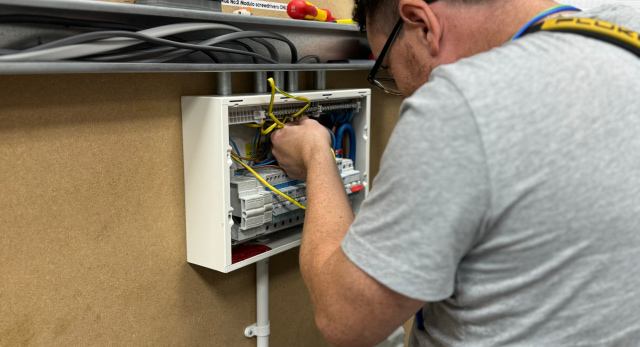How much do electricians earn in 2025? Most electricians in the UK earn between £30,000 and £45,000 a year. New starters can expect around £32,000, while experienced or specialist electricians can earn over £50,000. Self-employed electricians and those working in London often make even more. Electrician's pay depends on their level of skill, location, and whether they work for themselves or an employer.
The National Average Electrician Salary for 2025
According to the Office for National Statistics (ONS), from 2024, electricians have topped the trades salary charts for years, with the mean average of £38,760, and that figure keeps climbing.
Looking at our recent 2025 survey, Electrician Day Rates in the UK, the average day rate for electricians was £335. Applied to a 5-day, 52-week working year, it would be £87,100 annually. It is important to note that a very small number, if any, of individuals would work 5 days a week for all 52 weeks in a year. So, whilst this is higher than the average salary stated by the ONS, time for annual leave and absences from work should be taken into consideration.
What Factors Affect How Much Electricians Earn?
It’s not just about turning up with a screwdriver and a smile – several factors influence how much you’ll earn as an electrician:
- Experience: The more years you have, the higher your rate. Apprentices start at the bottom, but experienced sparks can command top dollar.
- Location: London and the South East always pay more, sometimes up to £600 a day, to match the higher cost of living and demand for skilled trades.
- Specialisation: Got skills in renewables, smart homes, or industrial systems? You’ll earn more than the average domestic installer.
- Employment Type: Self-employed electricians and business owners often earn more (before expenses) than those on the books.
- Qualifications: Advanced certifications and up-to-date training open doors to higher-paying jobs and contracts.
- Sector: Commercial and industrial work tends to pay better than domestic jobs, especially on large-scale projects.

How Much Do Apprentice Electricians Earn?
Everyone starts somewhere. For apprentice electricians, legally, the starting salary £7.55 per hour. It’s not glamorous, but it’s a solid foot in the door and can increase year by year. The table below shows the starting salaries for apprentices across different ages.
| Age | Hourly Rate |
|---|---|
| 16-18 | £7.55 |
| 19+ or in your first year | £7.55 |
| 19+ and have completed your first year | £12.21 |
The table is up-to-date as of 1st April 2025 and in accordance with the UK government’s outline for apprentices’ salary.
What to expect as a trainee:
- Most apprenticeships last 3-4 years and combine practical work with classroom learning.
- Pay increases as you progress through your apprenticeship.
- Once qualified, you can quickly jump to £32,000 a year or more.
How Much Do Electricians Earn Across the UK?
Where you work matters. Electricians in London and the South East consistently earn more than their counterparts elsewhere. Here’s a regional breakdown of average day rates:
| Region | Day Rate |
|---|---|
| London | £200-£600 |
| South | £200-£250 |
| Scotland | £200-£250 |
| North | £125-£250 |
Why the difference?
- Higher cost of living in London and the South East.
- More large-scale commercial projects.
- Greater demand for skilled trades.
For a deep dive into rates, check out our Electrician Day Rates in the UK 2025 blog.
Self-Employed vs. Employed Electricians: Who Earns More?
Here’s how the two paths stack up:
| Type | Average Annual Earnings | Pros | Cons |
|---|---|---|---|
| Employed | £32,000 – £52,000 | Stable income, benefits, paid holiday | Less flexibility, capped pay |
| Self-Employed | £44,600+* | Flexible hours, higher earning cap | No sick pay, must find clients |
*Please note that this is an average, and self-employed electricians can earn more or less.
Just be aware that being self-employed isn’t for everyone. You’ll need to hustle for clients, manage your own taxes, take expenses into consideration and cover your own insurance. But if you’re business-minded, the rewards can be significant.

Career Progression: How Can Electricians Boost Their Earnings?
The sky’s the limit if you’re ambitious and keep learning. Here’s how you can up your earning power:
- Get Qualified: Advanced qualifications (like the PAT Testing or Periodic Inspection and Testing) make you more valuable and open doors to bigger contracts.
- Specialise: Move into renewables (solar PV, EV charging, battery storage), smart home tech, or industrial systems for higher rates.
- Start Your Own Business: Once you’ve got the experience, setting up as a sole trader or limited company can significantly increase your income.
- Take on Supervisory Roles: Move into management, training, or consultancy for a new challenge and higher pay.
- Stay Up-to-Date: The industry is always evolving, especially with the push for net zero and smart tech. Regular training keeps you in demand.
The Future of Electrician Salaries: 2025 and Beyond
The outlook for electricians in the UK is seriously bright. Here’s why:
- Skills Shortage: The UK needs an extra 104,000 electricians by 2032 to fill the growing skills gap.
- Green Revolution: The shift towards renewables, electric vehicles, and smart homes is creating new opportunities and higher-paying roles.
- Rising Demand: New infrastructure projects, housing developments, and net-zero targets mean electricians are in demand year-round.
- Inflation: As living costs rise, salaries are increasing to keep pace, especially in urban areas.
If you’re considering a career change, now’s the perfect time to get qualified. Please find out more about our Electrician Training Courses and how to get started.
How to Become an Electrician (and Start Earning)
Ready to join the ranks? Here’s a quick roadmap:
- Get Qualified: Complete an apprenticeship or a new entrant electrical course.
- Gain Experience: Work under supervision to build your skills and confidence.
- Get Registered: Join a competent person scheme (like NAPIT, NICEIC, or STROMA) to self-certify your work.
- Keep Learning: Stay up-to-date with the latest regulations and technologies.
Logic4training has been helping people start their electrical careers for over a decade. Our courses are trusted by industry and recognised by leading certification schemes.
Real Electrician Stories: Job Satisfaction & Lifestyle
It’s not just about the money. Electricians report high job satisfaction thanks to:
- Variety – no two days are the same.
- Tangible results – you can see the difference you make.
- Independence – especially if you’re self-employed.
- Career progression – always something new to learn or specialise in.
Our electrical candidates’ testimonials show how we have helped people enter the electrical industry, and those who have gone on to upskill into renewables.
FAQs
How much does a newly qualified electrician earn in the UK?
A newly qualified electrician typically earns around £32,000 per year, with the potential to increase quickly as you gain experience.
Do electricians earn more in London?
Yes. Electricians in London can command day rates of £200–£600, significantly higher than the UK average, due to higher demand and cost of living.
Is it better to be self-employed or employed as an electrician?
Self-employed electricians often earn more before expenses, but must manage their own business costs and find clients. Employed electricians enjoy more stability and benefits, so it really comes down to individual career needs and goals.
What electrical specialists pay the most?
Electricians specialising in renewables, smart home tech, or commercial systems can earn upwards of £50,000 per year, especially in high-demand areas.
How do I become an electrician?
Start with an apprenticeship or a new entrant electrical course, gain experience, and register with a competent person scheme to self-certify your work.
Ready to spark your career?
If you have more questions about electrician salaries or training, please get in touch. We’re here to help you light up your career!









